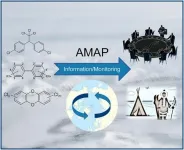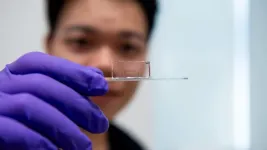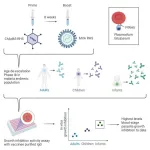(Press-News.org) Effluents from wastewater treatment plants have a dual effect: Some species disappear, while others benefit. Especially certain insect orders, such as stonefly and caddisfly larvae, are decimated. Certain worms and crustaceans, by contrast, can increase in number. A team from Goethe University Frankfurt led by Daniel Enns and Dr. Jonas Jourdan has corroborated this in a comprehensive study, which has now been published in the journal Water Research. They examined 170 wastewater treatment plants in Hesse in relation to species composition.
Wastewater treatment plants are an indispensable part of our modern infrastructure; they have made a significant contribution to improving the quality of our surface waters. However, their ability to completely remove what are known as micropollutants from wastewater is mostly limited. These substances include, for example, active ingredients from pharmaceuticals and personal care products, pesticides and other synthetic substances enter waterbodies via the treated wastewater, placing an additional burden on rivers and streams. This exacerbates the challenges faced by already vulnerable insect communities and aquatic fauna. Previous studies – which have primarily focused on single wastewater treatment plants – have already shown that invertebrate communities downstream of such effluents are generally dominated by pollution-tolerant taxa.
Until now, however, it was unclear how ubiquitous these changes are. That is why a team of biologists from Goethe University Frankfurt has now studied extensively how wastewater from 170 wastewater treatment plants in Hesse has an impact on the species composition of invertebrates. This has prompted a change in the common conception that human-induced stressors reduce the number of species in a habitat and thus their diversity: Rather, the findings indicate that a shift in species composition can be observed. The researchers were able to identify significant shifts in the composition of the species community between sites located upstream and downstream of wastewater treatment plants. Some species were particularly affected by effluents from wastewater treatment plants – such as stonefly and caddisfly larvae, which disappear entirely in some places. Other taxa, such as certain worms and crustaceans, by contrast, benefit and are found in greater numbers. This change can be observed especially in streams and smaller rivers. Overall, wastewater treatment plants alter conditions downstream to the advantage of pollution-tolerant taxa and to the disadvantage of sensitive ones.
How can we reduce water pollution?
Modern treatment techniques such as ozonation or activated charcoal filtering can make water treatment in wastewater treatment plants more efficient, allowing a wider range of pollutants, including many trace substances, to be removed from the wastewater before it is released into the environment. Merging smaller wastewater treatment plants can also contribute to reducing the burden on the environment. Whatever measures are taken, it is important to make sure that upstream sections are not already degraded and are in a good chemical and structural condition.
Publication: Enns D, Cunze S, Baker NJ, Oehlmann J, Jourdan J (2023) Flushing away the future: The effects of wastewater treatment plants on aquatic invertebrates. Water Research, 120388. doi.org/10.1016/j.watres.2023.120388
Picture download: https://www.uni-frankfurt.de/141365425
Caption:
Images 1+2: Treated wastewater is discharged into a nearby stream. In this way, numerous trace substances enter our waters. (Photos: Jourdan)
Image 3: The photograph shows a typical wastewater treatment plant. The wastewater passes through various treatment stages to remove pollutants before the treated water is discharged into the environment. (Photo: Jourdan)
Further Information
Dr. Jonas Jourdan
Senior Scientist
Institute of Ecology, Diversity and Evolution
Goethe University Frankfurt
Tel.: +49(0)69-798-42149
Email: jourdan@bio.uni-frankfurt.de
Twitter: @Jourdan_Jonas
END
Even treated wastewater affects our rivers
New study by Goethe University Frankfurt shows: Effluents from wastewater treatment plants change the invertebrate communities in Hesse’s waters
2023-08-11
ELSE PRESS RELEASES FROM THIS DATE:
Study: Infant formula safety checks can be improved with stratified sampling
2023-08-11
URBANA, Ill. – Producers of infant formula employ comprehensive food safety systems, including product testing to ensure those systems are working. A new study from the University of Illinois Urbana-Champaign finds that some testing methods are more powerful at catching contaminants than others.
Spacing out samples over time in a stratified sampling pattern is better at catching risky pathogens like Cronobacter than randomly sampling from the product as it is being produced, the researchers found. Furthermore, while taking more samples of product generally increases the chance to catch the pathogen, there is a point after which it ...
UTEP launches new research partnerships with Chihuahua universities
2023-08-11
EL PASO, Texas (Aug. 11, 2023) – How are our region’s pecan farms affected by drought? Is there a better way to address domestic violence in Ciudad Juárez? These are a few of the big questions scientists are asking as they prepare to embark on a new cross-border research collaboration.
Created by The University of Texas at El Paso, the U.S.-Mexico Faculty Collaboration Fellowship program will support research projects with higher education institutions in the State of Chihuahua to spur studies on issues ...
Behind the rind: new genomic insights into watermelon evolution, quality, and resilience
2023-08-11
Watermelon is a globally significant agricultural product, both in terms of the total amount produced and the total economic value generated.
Scientists at the Boyce Thompson Institute have constructed a comprehensive "super-pangenome" for watermelon and its wild relatives, uncovering beneficial genes lost during domestication that could improve disease resistance and fruit quality of this vital fruit crop.
"We aimed to delve deeper into the genetic variations that make watermelons so diverse and unique," stated ...
Arctic monitoring program plays vital role in global pollution reduction efforts
2023-08-11
Historically, the Arctic was considered a pristine region, but scientific research spanning the last three decades has revealed the harsh reality of long-range transported pollutants reaching the Arctic from different corners of the world. In response to this alarming discovery, AMAP was created with the mission to monitor pollution and its effects on the Arctic environment and human health.
In a new article published on 26 July 2023, in the journal Environmental Science and Ecotechnology, researchers from Arctic Knowledge Ltd, presents the initiation and implementation of a systematic scientific and political cooperation in the Arctic related to environmental ...
University of Chicago scientists invent smallest known way to guide light
2023-08-11
Directing light from place to the place is the backbone of our modern world. Beneath the oceans and across continents, fiber optic cables carry light that encodes everything from YouTube videos to banking transmissions—all inside strands about the size of a hair.
University of Chicago Prof. Jiwoong Park, however, wondered what would happen if you made even thinner and flatter strands—in effect, so thin that they’re actually 2D instead of 3D. What would happen to the light?
Through a series of innovative experiments, he and his team found ...
Malaria vaccine candidate appears safe and produces promising immune response in a cohort of Tanzanian infants
2023-08-11
An experimental malaria vaccine appears safe and promotes an immune response in African infants, one of the groups most vulnerable to severe malaria disease. There is currently only one malaria vaccine, “RTS,S” that is approved by the World Health Organization and offers partial disease protection. However, in the results of the early-stage phase Ib trial conducted in Tanzania and published on August 11th in the journal Med, researchers find that targeting RH5 – a protein that the malaria pathogen Plasmodium falciparum uses to invade red blood cells – can generate a promising immune response ...
A roadmap to help AI technologies speak African languages
2023-08-11
From text-generating ChatGPT to voice-activated Siri, artificial intelligence-powered tools are designed to aid our everyday life — as long as you speak a language they support. These technologies are out of reach for billions of people who don’t use English, French, Spanish or other mainstream languages, but researchers in Africa are looking to change that. In a study published August 11 in the journal Patterns, scientists draw a roadmap to develop better AI-driven tools for African languages.
“It doesn’t ...
Synthetic extracellular matrix supports endometrial organoids
2023-08-11
Scientists have developed a synthetic extracellular matrix (ECM) that can support the growth of a mini endometrium in a dish for at least two weeks. The endometrium—the mucosal lining of the uterus—has been historically hard to model in the lab, which has limited scientists’ ability to study its role in healthy and diseased states like endometriosis. The matrix, described on August 11 in the journal Med, allows cells to interact in an environment that recapitulates human physiology which could help researchers better simulate the healthy and pathological response to menstrual cycles.
“With this matrix, we can begin to extrapolate and utilize ...
Using the body’s “invisible scalpel” to remove brain cancer
2023-08-11
LA JOLLA (August 11, 2023)—Glioblastoma, the most common and deadly form of brain cancer, grows rapidly to invade and destroy healthy brain tissue. The tumor sends out cancerous tendrils into the brain that make surgical tumor removal extremely difficult or impossible.
Now, Salk scientists have found the immunotherapy treatment anti-CTLA-4 leads to considerably greater survival of mice with glioblastoma. Furthermore, they discovered that this therapy was dependent on immune cells called CD4+ T cells infiltrating the brain and triggering the tumor-destructive activities of other immune cells ...
Playing football may increase the risk for Parkinson’s disease
2023-08-11
(Boston)—Identification of risk factors for Parkinson’s disease (PD) is essential for early diagnosis. Dating back to the 1920s, Parkinson’s disease and parkinsonism—an umbrella term that refers to motor symptoms found in Parkinson’s disease and also other conditions—have long been described in boxers. Repetitive head impacts from tackle football can also have long-term neurological consequences like chronic traumatic encephalopathy (CTE). But research on the association between participation in tackle football and PD is limited.
In the largest study to describe the association between participation ...
LAST 30 PRESS RELEASES:
ASU researchers to lead AAAS panel on water insecurity in the United States
ASU professor Anne Stone to present at AAAS Conference in Phoenix on ancient origins of modern disease
Proposals for exploring viruses and skin as the next experimental quantum frontiers share US$30,000 science award
ASU researchers showcase scalable tech solutions for older adults living alone with cognitive decline at AAAS 2026
Scientists identify smooth regional trends in fruit fly survival strategies
Antipathy toward snakes? Your parents likely talked you into that at an early age
Sylvester Cancer Tip Sheet for Feb. 2026
Online exposure to medical misinformation concentrated among older adults
Telehealth improves access to genetic services for adult survivors of childhood cancers
Outdated mortality benchmarks risk missing early signs of famine and delay recognizing mass starvation
Newly discovered bacterium converts carbon dioxide into chemicals using electricity
Flipping and reversing mini-proteins could improve disease treatment
Scientists reveal major hidden source of atmospheric nitrogen pollution in fragile lake basin
Biochar emerges as a powerful tool for soil carbon neutrality and climate mitigation
Tiny cell messengers show big promise for safer protein and gene delivery
AMS releases statement regarding the decision to rescind EPA’s 2009 Endangerment Finding
Parents’ alcohol and drug use influences their children’s consumption, research shows
Modular assembly of chiral nitrogen-bridged rings achieved by palladium-catalyzed diastereoselective and enantioselective cascade cyclization reactions
Promoting civic engagement
AMS Science Preview: Hurricane slowdown, school snow days
Deforestation in the Amazon raises the surface temperature by 3 °C during the dry season
Model more accurately maps the impact of frost on corn crops
How did humans develop sharp vision? Lab-grown retinas show likely answer
Sour grapes? Taste, experience of sour foods depends on individual consumer
At AAAS, professor Krystal Tsosie argues the future of science must be Indigenous-led
From the lab to the living room: Decoding Parkinson’s patients movements in the real world
Research advances in porous materials, as highlighted in the 2025 Nobel Prize in Chemistry
Sally C. Morton, executive vice president of ASU Knowledge Enterprise, presents a bold and practical framework for moving research from discovery to real-world impact
Biochemical parameters in patients with diabetic nephropathy versus individuals with diabetes alone, non-diabetic nephropathy, and healthy controls
Muscular strength and mortality in women ages 63 to 99
[Press-News.org] Even treated wastewater affects our riversNew study by Goethe University Frankfurt shows: Effluents from wastewater treatment plants change the invertebrate communities in Hesse’s waters







